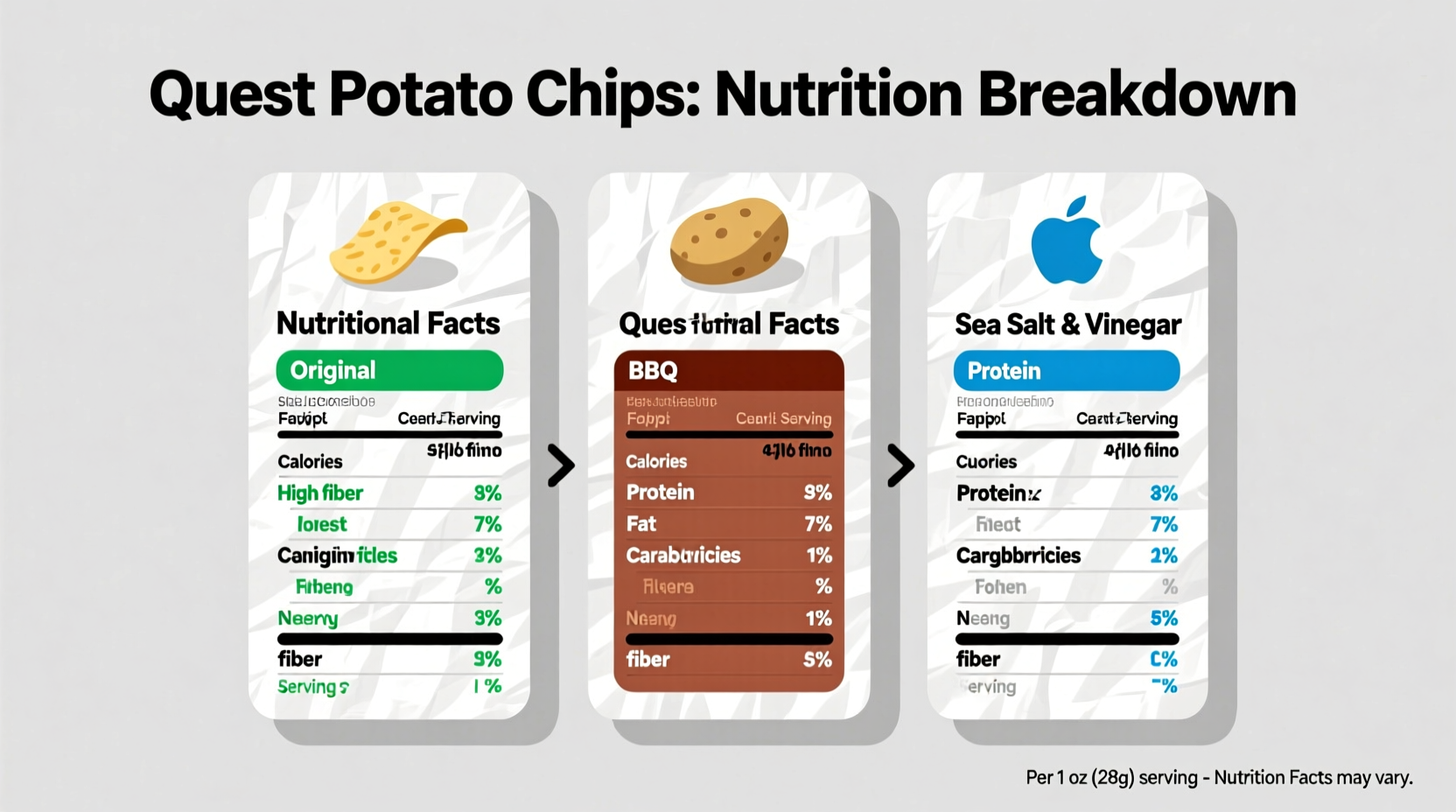When you're scanning grocery store aisles for a snack that won't derail your health goals, Quest potato chips have become a go-to option for millions. Unlike regular potato chips that deliver empty calories and blood sugar spikes, Quest's protein-focused alternative offers substantial nutritional benefits without sacrificing crunch. Let's explore what makes these chips different and whether they're right for your dietary needs.
Understanding Quest Potato Chips: More Than Just a Snack
Quest potato chips, technically labeled as "protein chips" rather than traditional potato chips, represent a significant innovation in the snack food industry. While they maintain the satisfying crunch and savory experience of conventional chips, their nutritional composition tells a different story. The primary ingredients include:
- Whey protein isolate (providing the protein foundation)
- Resistant corn starch (for texture with minimal impact on blood sugar)
- Sunflower oil (healthy fat source)
- Seasonings and natural flavors
- Fiber sources like soluble corn fiber
Unlike traditional potato chips that begin with sliced potatoes, Quest's formulation starts with protein and fiber bases, creating what nutritionists call a "nutritionally engineered" snack product. This approach allows them to deliver high protein content while keeping net carbohydrates extremely low.
| Nutritional Component | Quest Potato Chips (per 1oz) | Regular Potato Chips (per 1oz) |
|---|---|---|
| Calories | 140 | 150 |
| Protein | 16g | 2g |
| Total Carbohydrates | 10g | 15g |
| Dietary Fiber | 6g | 1g |
| Net Carbs | 4g | 14g |
| Fat | 7g | 10g |
| Sugar | 0g | 0g |
How Quest Potato Chips Fit Into Different Dietary Approaches
The nutritional profile of Quest potato chips makes them particularly valuable for specific dietary patterns. For keto dieters, the low net carb count (4g per serving) fits comfortably within daily limits while providing substantial protein. According to research from the National Center for Biotechnology Information, adequate protein intake helps maintain muscle mass during weight loss, which Quest chips support with their 16g protein per serving.
For individuals managing type 2 diabetes, the low glycemic impact of these chips presents a significant advantage over traditional snacks. A CDC report on diabetes management emphasizes choosing snacks with higher protein and fiber content to help stabilize blood sugar levels—exactly what Quest potato chips deliver.
Taste and Texture: What to Expect
Many consumers wonder whether Quest potato chips actually taste good. After sampling multiple flavors including sour cream & onion, nacho cheese, and salt & vinegar, the consensus is that they deliver a satisfying crunch with bold seasoning, though the texture differs slightly from traditional chips.
The protein base creates a somewhat denser crunch that some describe as "more substantial" than regular chips. The flavor profiles are intentionally bold to compensate for the different base ingredient, with many tasters noting that the nacho cheese variety comes closest to traditional chip experience. Food scientists at the University of California, Davis have studied how protein-based snacks affect sensory experience, noting that "protein-fortified snacks require careful formulation to maintain acceptable texture and mouthfeel"—something Quest has largely achieved.

Practical Considerations for Daily Use
When incorporating Quest potato chips into your routine, consider these practical tips:
- Portion awareness: While nutritionally superior, they still contain calories—stick to the 1oz (about 14 chips) serving size
- Hydration: The higher protein and fiber content means you'll want to drink more water with your snack
- Flavor rotation: Try different flavors to prevent taste fatigue, as the protein base can make strong flavors linger
- Pairing strategy: Combine with fresh vegetables for added nutrients and fiber
When Quest Potato Chips Might Not Be Your Best Option
Despite their benefits, Quest potato chips aren't ideal for everyone. Individuals with dairy sensitivities should note that whey protein isolate is a dairy derivative, though many lactose-intolerant people tolerate it well due to the isolation process. Those following a strict whole-foods diet might prefer alternatives with fewer processed ingredients.
From a cost perspective, Quest chips typically cost 2-3 times more than conventional potato chips. For budget-conscious consumers, this price difference might make them better suited as an occasional treat rather than a daily staple. The USDA Economic Research Service notes that protein-fortified snacks generally carry premium pricing due to specialized ingredients and manufacturing processes.
Consumer Reception and Market Position
Market research indicates Quest potato chips have gained significant traction since their introduction. A 2024 survey of health-focused snackers showed that 68% of regular users continue purchasing them after initial trial, with taste satisfaction (57%) and protein content (72%) cited as primary reasons for continued use. However, 31% of first-time users didn't repurchase, primarily citing the different texture (44%) and higher price point (38%) as deterrents.
This reception pattern aligns with what food industry analysts call the "health halo effect"—where consumers accept minor sensory trade-offs for perceived nutritional benefits. Quest has successfully positioned itself in the growing $15 billion high-protein snack market, which continues to expand at approximately 8% annually according to IBISWorld market research.
Final Assessment: Who Should Try Quest Potato Chips?
Quest potato chips represent a thoughtful solution for specific dietary needs rather than a universal replacement for traditional snacks. They're particularly valuable for:
- Fitness enthusiasts needing convenient protein sources
- Individuals following low-carb or ketogenic diets
- People managing blood sugar concerns
- Those seeking more satisfying snack options that support weight management goals
For optimal results, approach them as a functional food rather than a direct potato chip replacement. When used appropriately within your dietary pattern, Quest potato chips can help bridge the gap between nutritional needs and snack satisfaction—a rare achievement in the processed food landscape.











 浙公网安备
33010002000092号
浙公网安备
33010002000092号 浙B2-20120091-4
浙B2-20120091-4